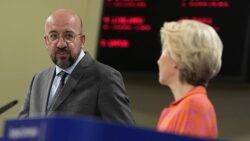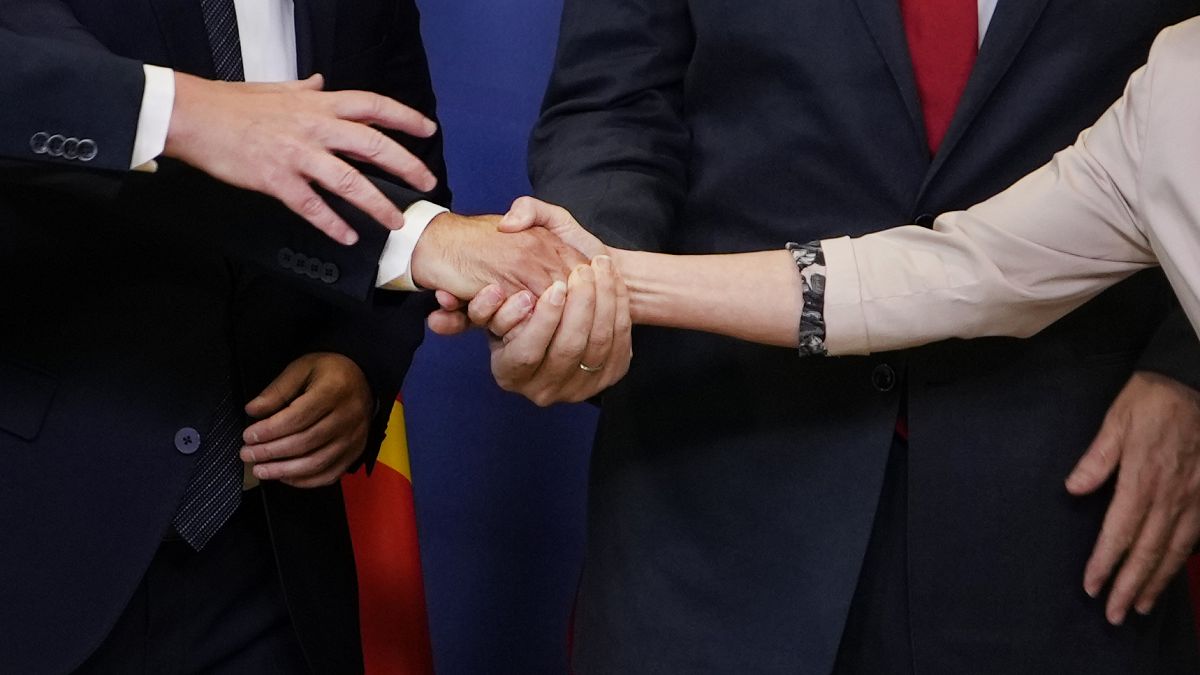The next round of EU sanctions against Russia aims to close loopholes and crack down on circumvention and could target companies and countries that help Russia acquire sanctioned goods.
An intense diplomatic week is starting for the EU on Tuesday with the bloc determined to put support for Ukraine and sanctions against Russia at the centre of discussions.
The first summit of the week will be in Reykjavik, Iceland where the leaders of 46 members of the Council of Europe will convene. The leaders of France, Germany, Italy and the heads of the European Commission and Council will then head to Hiroshima, Japan, for a G7 leaders’ summit. The latter two will then hop over to Seoul for an EU-South Korea summit.
Ursula von der Leyen, the president of the European Commission, told reporters on Monday that the main underlying message the EU will be keen to push is the bloc’s united determination to support Ukraine for as long as it takes as it fights Russia’s invasion and to ensure Moscow is held accountable for the war and the atrocities committed.
At the G7 summit, where the US, UK, Canada and Japan, also sit at the table, the EU wants members to take stock of the packages of sanctions already rolled out against Russia as well as those in the making.
EU countries are currently negotiating an 11th round of sanctions aimed at closing loopholes and tackling circumvention. The new measures will allow the bloc to target companies and countries that are believed to help Russia evade the penalties.
One of the worries is that some third countries have been importing sanctioned EU goods and then exporting them to Russia, thus allowing Moscow to acquire dual-use technology that can be used by the military despite the bloc’s export ban.
Von der Leyen said of the planned measure that “it’s basically a warning that we are serious about our sanction that we could ban these goods from going to that third country if there is clear evidence that this is a circumvention of sanctions and deliverable deliveries to Russia.”
She also said the proposed raft of sanctions could extend the list of EU products banned from transiting via Russia.
“We see that there is a discrepancy between what starts in the European Union, transits Russia and then ends up in the third country. And therefore, we are discussing as a deterrent the question of whether there should be such a transit ban. There are several watch points within the mechanism to make sure that it is justified,” she added.
But the EU knows it also needs to focus on outreach, Michel said, in particular with developing countries to not only strengthen ties but also explain the sanctions against Russia.
This will be primarily addressed at the G7 summit where eight other nations — Australia, Brazil, Comoros, India, Indonesia, South Korea, the Cook Islands, and Vietnam — have also been invited.
Some countries in the Global South have repeated the Russian narrative that the West is endangering global food security despite the fact Russian agrifood products have not been sanctioned and can therefore be exported worldwide and transit through the EU.
“We will discuss openly and frankly about why we are convinced these sanctions are necessary and justified. Russian propaganda is built on lies and conspiracy. We are fighting back with the facts and figures,” Michel told reporters.
“Developing and emerging countries have expressed concerns that the G7 is focusing too much on Ukraine and not paying enough attention to their needs and priorities. And we have heard their concerns. We want to build strong partnerships with developing and emerging countries in ways that are mutually beneficial.
China will be the other main topic as the EU and other Western allies seek to “de-risk” by reducing economic dependencies on Beijing. The EU wants for instance to toughen its arsenal to ensure key infrastructure and technologies remain under European control with the deployment of an outbound investment screening or advanced export controls.
Finally, the green transition and the need to accelerate the rollout of clean tech should also be on the agenda of the various summits.





